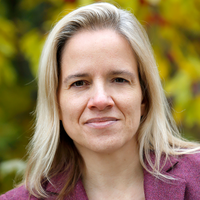2022-23 Research Highlights
Milestone: Children's book uncovers uncommon side of unconditional love
Inspired by qualitative data from her graduate thesis at the University of Calgary, Hee-Jeong Yoo, a clinical therapist, and UCalgary Social Work professor and researcher Dr. Christine Walsh co-authored My Momma Loves Me. The charming and beautiful children’s book narrates the tale of an inquisitive squirrel exploring motherhood by interacting with various Canadian critters. Initially, Yoo and Dr. Walsh’s research focused on resilient mothers who had faced homelessness and child welfare, primarily disseminated through academic channels. However, they believed these stories deserved a broader audience.
Collaborating with Social Work student-artist Mihaela Slabé and designer Chelsey Dyer, they crafted a visually captivating book to convey these narratives to young readers. They employed various animal species to represent diverse mothering practices. Ultimately, the book honours the strength and commitment of mothers, spotlighting their distinct interpretations of exceptional motherhood.
Dr. Régine King
Between 2022-2023, Dr. Régine King co-authored four successful grant applications critically examining equity, diversity, inclusion and accessibility issues to generate new insights regarding racial equity, inclusive education and their impact on policy, contributing to health and social science research.
These projects also reflect Dr. King's diverse interests, including Canadian Institutes of Health Research (CIHR)-funded research on a training platform for system and population transformations in girls and women's health. Dr. King initiated work on two SSHRC projects, one investigating resistance to integrating social justice in professional training and another exploring an Afrocentricity paradigm for social work education and practice. In 2023, she was appointed as one of the inaugural UCalgary Research Excellence Chairs and her research informed The City of Calgary's recent Anti-Racism Strategy.
Dr. David Nicholas
Creating meaningful experiences for neurodivergent people
For neurodivergent individuals, transitioning to meaningful employment or volunteer activities after leaving high school can be a significant challenge.
"After high school, access to meaningful activities significantly diminishes, potentially leaving individuals with less structure and support in their daily lives,” says Dr. David Nicholas. “This void is what we call 'the cliff.' However, it doesn't have to be this way. We need to explore better pathways that enable people to grow, live and thrive in their communities."
Dr. Nicholas leads the Vocational Abilities Innovation Lab, internationally acclaimed for its innovative, eco-systemic approach to employment and post-secondary education access for autistic and other neurodivergent youth and adults. The lab collaborates with numerous Canadian community and post-secondary partners and international colleagues, including La Trobe University in Australia. Dr. Nicholas recently presented his work at Ben Gurion University in Israel.
Dr. Gina Dimitropoulos
Supporting children and youth
Dr. Gina Dimitropoulos diligently identifies gaps, holes and occasional cliffs. Her research is dedicated to understanding the needs of adolescents and youth with complex health and mental health issues in allied health fields who are transitioning to adult services and programs. Dr. Dimitropoulos seeks to identify service deficiencies to improve support for youth and their families during this transition. Last year, she spearheaded TransitionED, supported by the CIHR, a national project that fosters a comprehensive dialogue involving researchers, policymakers and decision-makers, as well as young people and their families from eating disorder programs across Canada.
"Many young individuals fall through the cracks in the system, leading to difficulties accessing services, exacerbating their eating disorder while awaiting care,” says Dr. Dimitropoulos. “We're also collaborating with scholars and providers addressing the unique challenges and barriers faced by Indigenous youth, racialized youth, 2SLGBTQIA+ individuals and those experiencing economic disparities. They may require additional support for a successful transition to adult-focused care as they enter adulthood."

Many young individuals fall through the cracks in the system, leading to difficulties accessing services, exacerbating their eating disorder while awaiting care,” says Dr. Dimitropoulos. “We're also collaborating with scholars and providers addressing the unique challenges and barriers faced by Indigenous youth, racialized youth, 2SLGBTQIA+ individuals and those experiencing economic disparities. They may require additional support for a successful transition to adult-focused care as they enter adulthood.

Dr. Gina Dimitropoulos
Preventing child abuse
In 2023, Dr. Dimitropoulos, an inaugural UCalgary Research Excellence Chair, received the Alberta Government Inspiration Award for her innovative efforts in combatting child abuse. The award
recognizes her "significant contributions to preventing child abuse in Alberta." Through collaborations with
various agencies in education, law enforcement, health care and child welfare across the province, she uncovered that online sexual exploitation is nearly as prevalent as in-person sexual abuse.
Dr. Dimitropoulos is currently partnering with Alberta organizations to enhance the response capabilities of front-line professionals regarding suspicions of online sexual exploitation. She is also developing and testing new mental health treatments for children affected by abuse, aiming to break the cycle of abuse and reduce intergenerational trauma.
Helping front-line allied health professionals deal with moral injury
Dr. Dimitropoulos also secured a UCalgary Catalyst grant for her role in an interdisciplinary team. They are working on an innovative project to create and test an electronic health intervention aimed at supporting social workers and nurses who encounter moral injury. Moral injury involves traumatic situations in which individuals may perpetrate, fail to prevent or witness events that contradict their deeply held moral beliefs and expectations.
